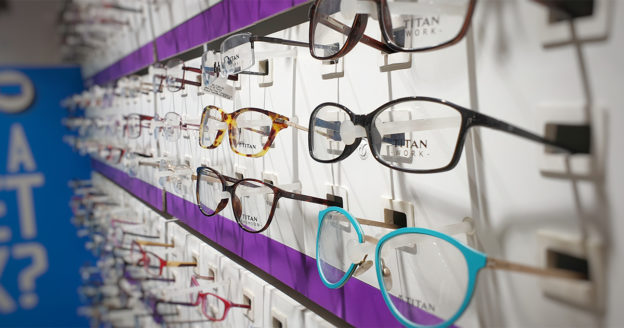If you are prescribed glasses, there are lots of things to consider in choosing the right pair for you. Choosing the right frames for your face is just one step in finding the perfect pair.
Choosing the right lenses for your glasses can is key to getting the most out of your glasses for comfort, vision and safety. Here are some important factors to consider when selecting lenses for your glasses:
The lens material
Glass
Historically, all spectacle lenses used to be made of glass.
Glass lenses offer up probably the best visionary results. However, their heavy weight and fragile makeup mean they break easily. Broken glass lenses pose potentially serious harm to the eyes. So glass lenses are used less frequently now.
Plastic
Plastic lenses are a very popular option in place of glass. Plastic lenses are lightweight and cheaper, whilst still offering great vision qualities.
Polycarbonate
Polycarbonate lenses were first introduced for use in safety glasses. It has since gained popularity due to its lightweight and higher impact-resistance. For that reason, polycarbonate is suited well to children’s glasses.
You might hear of a material called Trivex when choosing lenses for your new glasses. This is a material with very similar properties as polycarbonate.
The lens type
Single vision lenses > These lenses have one prescription throughout them
Reading glasses > These lenses also have one prescription running through them, but are tailored to your reading distance
Varifocal lenses > These lenses combine far distance, intermediate, and close-up vision, without the need for multiple pairs of glasses
Bifocal lenses > Bifocal lenses combine two different prescriptions and are divided into two parts
The lens coating
Many lenses will already have a scratch-resistant coating, and some will even have anti-reflective coatings as standard. Depending on your lifestyle, you may want to add some other coatings to your lenses to provide you with extra protection.
Some of these coatings are:
Anti-smudge > This coating will prevent smears from showing on your glasses, improving the clarity of vision
UV Coating > Adding a UV coating can help to provide the same protection as sunglasses, without changing the tint or needing multiple pairs of glasses
Premium coatings will offer a combination of these protective benefits.
There are many variants and options to be considered when choosing both your lenses and frames, and the cost will vary depending on your fashion and visual requirements. To achieve the best value, talk with your optometrist, we are happy to give you advice on what will be best for you.
Regular and comprehensive eye examinations are important for overall eye health. To book an appointment today, get in touch with us.

